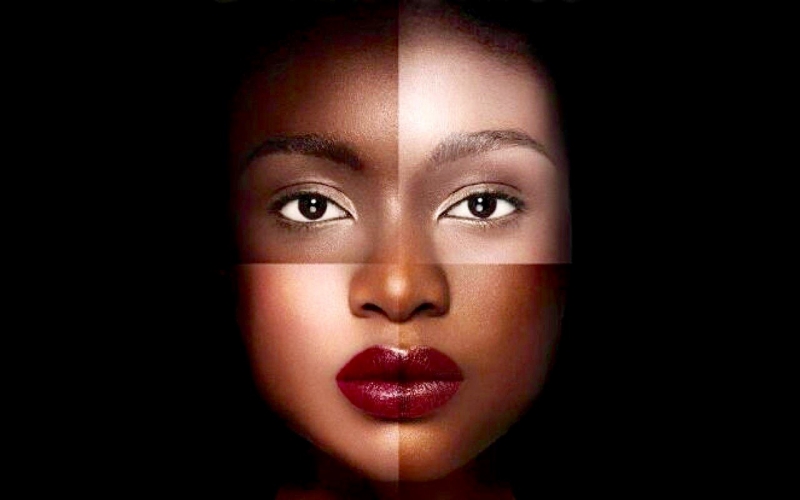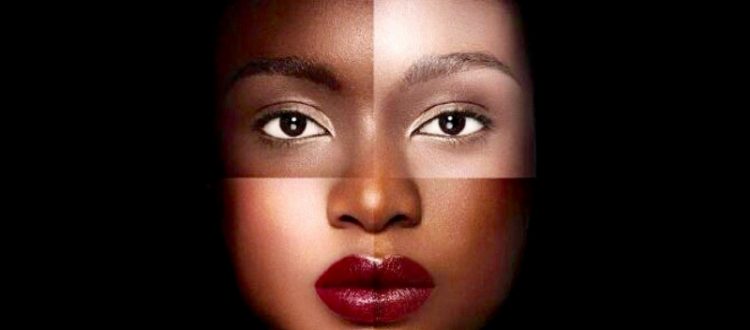
By: Nicole A. Simmonds-Jordan
Around the world, there is a class hierarchy that favors Eurocentric and white features while creating a fear factor among those who do not. I am a dark-skinned Black woman, my mother is a dark-skinned Black woman, and my father can pass for white because of his light skin. As a child, people would question my father’s paternity because of the shade of his skin, not the color, but the shade. My reality of understanding colorism peaked when I entered a conservatively white high school. My white peers would always tell me that I was “pretty for a Black girl,” as if being a Black girl is not pretty. Since then, I have learned that colorism has been an uncomfortable truth for Black women that emerged from slavery and has torn the Black community and segregated us by shade. My truth exposes the world’s fascination with women with Eurocentric features—from the shade of their skin to the flex of their hair— Black women are constantly tested.

image source: NCCJ
This obsession mainly divides Black women as it positions dark-skinned Black women as least ideal while creating a sliding scale of beauty that says the closer you are to white, you might be alright. Many tests have measured this scale since slavery beginning with the brown paper bag test that deplored Black people for their blackness. If a slave was darker than the color of the brown paper bag, it meant they had to work further away from the home. The “brown paper bag” test and the “blue vein society” tested your blackness by the shade of your skin. To be a member of the blue vein society, your veins had to be bright enough, or your skin had to be light enough to see your veins.
Black women’s natural hair has also been a reoccurring theme of blackness. The “ruler test” required your hair to be straighter than a ruler, and the “comb test” ensured that a fine-tooth comb could easily go through one’s hair. Passing these tests would gain you access to social opportunities and education, making it difficult for many lighter-skinned Blacks to abandon the opportunity that came with dismissing their very own race. Far too many Blacks stand behind this white supremacist ideology founded in slavery that is kept silent because of shame.
Those who pass the reprehensible tests of colorism are frequently confronted with, “What are you?”. This question is positioned to lighter-skinned Black people, like my father as if light skin means you cannot be just Black, and people assume a level of disappointment when you only associate with Black. To this day, my father gains compliments and questions while my mother becomes deaf to ears and blind to eyes. So, when white people say they do not see color, it is them having selective vision.
Colorism is a well-documented complexity that causes Black women to be born into a life of grief with limited opportunities to thrive. Darker-skinned Black women like me are seen as intense and intimidating, and lighter-skinned women are seen as soft and serene. Until we can celebrate the full spectrum of Black beauty, we will all stand in line after all the people with more powerful Eurocentric features in the hierarchal scheme that the world prepared for us. Colorism has wrapped its arms around the Black community and disguised itself as acceptable to meet our internalized systems of control.
Colorism has divided and destroyed hopes of creation, collaboration, and future economic progress. The confines of colorism force people to live within a box of ideals that a white man put in place, but as Black women, we must come together to free ourselves from colorism in our everyday lives. Colorism has manipulated Black America into an intraracial war that is besetting those of our race. From the “comb test” to the “blue vein society,” white people have engrained the theme of intraracial loathing that has inadvertently abused our community. As the world’s racist roots continue to present themselves, colorism deserves to be outed and denounced just as much as racism.

Nicole A. Simmonds-Jordan (source: LinkedIn)
About Nicole A. Simmonds-Jordan
Nicole A. Simmonds-Jordan is a Global Account Director at PDT Global. Nicole serves as an inclusion advisor and expert for businesses that are ready to accelerate their inclusion journey. Nicole is a creative optimist who enjoys writing as a bridge towards healing key life relationships. As an expert communicator and published writer, Nicole can create grassroots and evergreen content that engages all demographics. Nicole enjoys addressing international inclusion barriers from a global citizen position and works with US organizations from a Black feminist lens with a lifetime of lived experiences of intersectional oppression. Nicole’s vivid personality will capture any audience and bring them on a journey towards a more inclusive environment without any delay.


